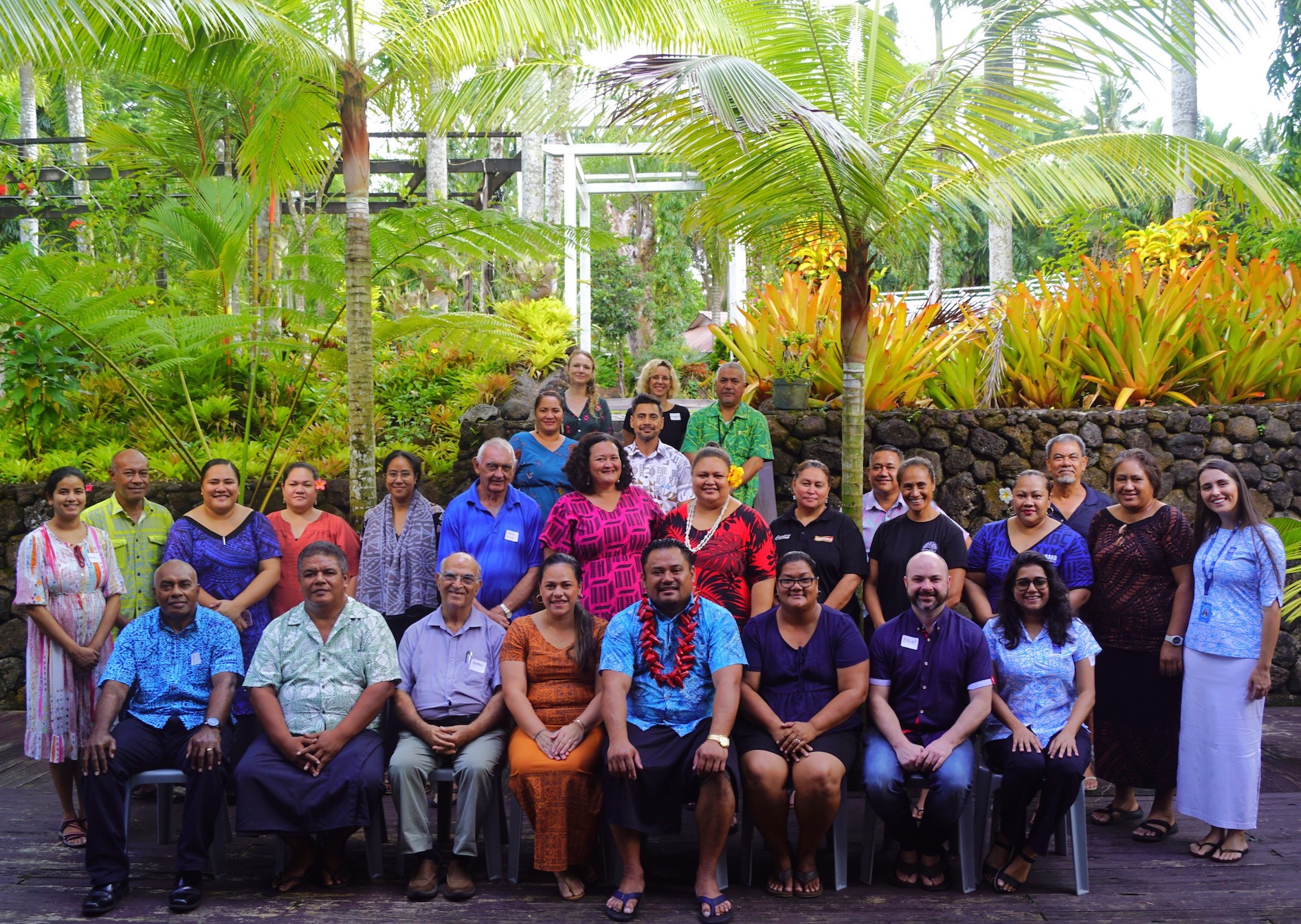Circular Economy embraced and localised the Samoan way
April 12, 2024

Participants of the CERO Waste workshop held in March at the Orator Hotel, from the public & private sectors and civil society
Apia, SAMOA – The term, Circular Economy, may be considered a new concept by some, but evidence suggests that this has been widely practiced by many Samoans over the years.
The Circular Economy refers to a system that aims to minimise waste and promote a sustainable use of natural resources, through smarter product design, longer use, recycling and more, as well as regenerate nature. Besides helping tackle the problem of pollution, a Circular Economy can play a critical role in solving other complex challenges such as climate change and biodiversity loss.
Local champions of circularity echoed during a recent week-long workshop hosted by the Ministry of National Resources and Environment (MNRE), in partnership with the United Nations Development Programme (UNDP), that circularity is culturally practiced through our reuse of green waste to produce handicrafts and arts. Samoan green waste regeneration to produce goods is part of a strong cultural tradition of reusing and repurposing items that is integrated in our way of living and aligns well with the principles of the Circular Economy.
“Green waste was always perceived as wealth in the olden days,” said workshop participant, Agnes Fruean of This N That, a local business that specializes in repurposing waste products, such as discarded fabrics and materials, into bags and other accessories. “There is a growing market for eco-friendly products made from sustainable resources. However, there is no thriving ecosystem and business-enabling environment locally to upscale value chains and market access to maximize the circularity of man-made waste.”
Waste continues to be a challenge in Samoa, and the continued reliance on imports of manufactured goods has impacted the natural environment due to the increased generation of plastic waste and related pollution. Solutions need to be found, urgently. The Government of Samoa, through its efforts to establish a standalone Waste Management and Pollution Control Division, prioritises the need for effective measures for waste management and is greatly supportive of the Circular Economy approach, channelled through the CERO Waste Project.
“Our Circular Economy portfolio should mean that our collective commitments, efforts and most importantly, our actions, are complementary, whether it be from the public or private sector as well as civil society,” said Fuimaono Katenia Rasch, Assistant Chief Executive Officer, MNRE Waste Management and Pollution Control Division.
MNRE, in partnership with UNDP, is implementing a Circular Economy for the Recovery of Waste (CERO Waste) Project to address waste management issues and recover certain low-value waste items for a cleaner and healthier environment. The development of the Circular Economy Policy for Waste Management is forthcoming under this partnership. The CERO Waste Policy will provide a pathway for Samoa’s waste management activities, embracing recycling and the regenerative use of waste materials and products to achieve zero waste.
“The Circular Economy is based on the principles of ‘designing out’ waste and pollution, keeping products and materials in use, and regenerating natural systems. This means moving away from the traditional linear economy model of ‘take-make-dispose’ towards a more sustainable approach that values resource efficiency and environmental protection,” said Aliona Niculita, UNDP Resident Representative.
Applying the Samoan way of green waste regeneration to localise the shift towards a circular economy of man-made waste can potentially create new opportunities for economic growth and innovation. By promoting circularity on existing best practices within Samoa and from around the region through recycling, reusing and repurposing materials, there is potential for local industries to turn green and biodegradable.
For this to happen, there needs to be a shift in mindset and behaviour. Workshop participants said unless there is a shift in the demand for these imported products, waste will continue to be major, unsustainable problem for Samoa.
Taking the circularity path will mean that Samoa can reduce its dependency on imported goods and decrease its carbon footprint potential to benefit both the people and its delicate environmental ecosystems.
With a growing awareness of the negative impacts of pollution and waste on the environment, Samoa is looking towards the Circular Economy to create a more sustainable and prosperous future.
UNDP has been working with the British High Commission in Samoa, the Government of Samoa through MNRE, and other key partners such as SPREP, the private sector and local NGOs and communities such as the Samoa Recycling and Waste Management Association (SRWMA), and the Samoa and Tokelau Association of Recyclers (STAR), to channel support and attention to the Circular Economy in Samoa.
Overall, the circular economy offers Samoa a pathway towards a more sustainable and environmentally friendly future. By embracing this not so new concept, Samoa can reduce its waste problem, create new economic opportunities, and protect its natural resources for generations to come. It is a promising approach that has the potential to transform Samoa's economy and society for the better.
For more information about the project, please contact:
Ms. Marina Orruela Monteoliva, Innovative Programming and Partnerships Analyst
UNDP Multi Country Office, Samoa | Tel. +685 23670 (ext. 66) | E: marina.monteoliva@undp.org
For media queries, please contact:
Ms. Laufālē’ainā Lesā, Communications Analyst, UNDP Multi Country Office, Samoa | Tel. +685 23670 | E: laufaleaina.lesa@undp.org | www.ws.undp.org

 Locations
Locations